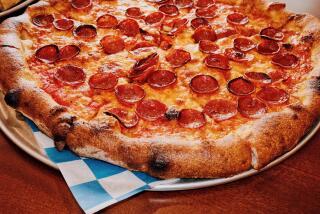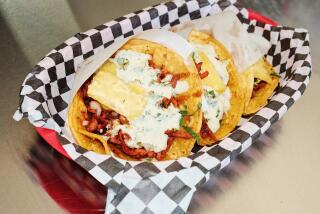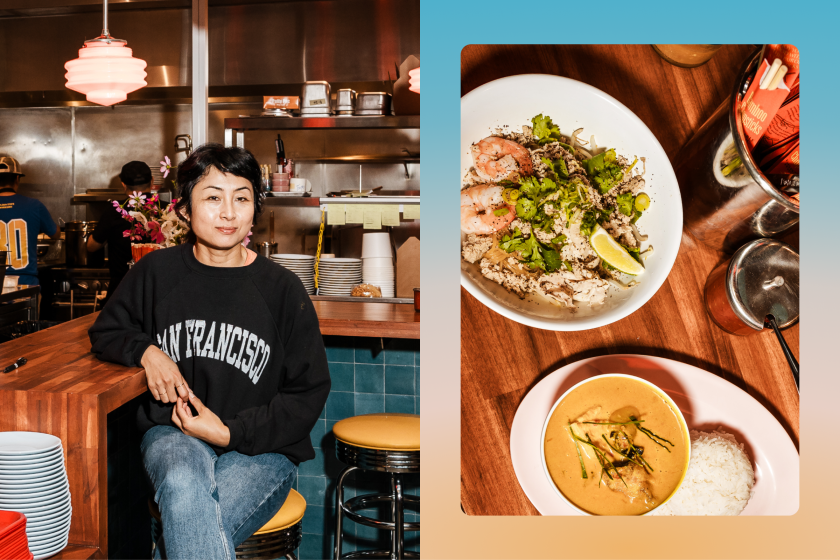King Taco Got Start in Old Ice Cream Van
His friends believed that Raul O. Martinez had lost his mind. Martinez had a plan to sell soft-shell tacos out of a renovated ice cream truck on the streets of East Los Angeles.
“How will you sell those kinds of tacos?” he was asked. Despite the skepticism, Martinez, his wife and father at his side, parked the truck next to an East Los Angeles bar on a summer night in 1974.
Martinez sold $70 worth of tacos that first night and soon afterward was selling $150 an evening. Six months later, he opened the first King Taco restaurant.
This year, Martinez’s King Taco Restaurants Inc. will post about $10 million in sales. The East Los Angeles company boasts three “taco trucks”--including a $100,000, 40-foot trailer--and 10 taco stands and restaurants. Martinez is preparing to expand the chain beyond its East and Central Los Angeles stronghold to the rest of Southern California and the state.
“They told me I was crazy,” said Martinez, 46, sitting in King Taco’s large conference and training room outfitted with a refrigerator, television monitors and videocassette recorders. “But . . . here I am.”
The company Martinez has built is one that takes every opportunity to promote its main product. A mural inside the chain’s largest restaurants details the history of the taco. Need to call the main office? Dial 26-TACOS.
Martinez, a Mexican immigrant who has held jobs as a Mexico City traffic cop and Los Angeles-area dishwasher, takes taco making very seriously and scoffs at the idea that anybody can make a taco. “Making a taco is an art,” Martinez claims.
While that may be debatable, there is no debating the loyalty of King Taco’s patrons, 80% of whom are Latino.
“These are the ultimate Mexican-style tacos,” said Juan Camaney, 23, who visits King Taco No. 2--the chain’s largest restaurant on Third Street in East Los Angeles--at least twice a week. “And they make salsa like you wouldn’t believe.”
King Taco No. 2 is the crown jewel in the King Taco empire. Open 22 hours a day, the restaurant--helped out by a King Taco catering truck on busy nights--serves 50,000 85-cent tacos a week during peak summer months. Industry executives estimate that the restaurant rings up an estimated $4 million in annual sales.
The King Taco operation caught the attention of managers at Boys Markets, which invited the company to open an outlet in its new Lynwood store, geared to a primarily Latino clientele. If all goes well, Boys Markets might make room for King Taco outlets in its other supermarkets.
“They’re running an excellent operation,” said Peter J. Sodini, president of the supermarket chain. The large crowds of customers that gather at King Taco No. 2 “say a lot about how the product and service are perceived in the community,” he said.
Martinez rules King Taco and its 220 employees from a cluster of buildings that occupy nearly an entire city block in a shabby industrial section of East Los Angeles. A large parking lot is home to the King Taco trucks (The first taco truck was destroyed a few years ago after a propane gas tank exploded). The prime parking space, however, is occupied by Martinez’s gold-toned Mercedes 450 SL.
Uniformity Key
A large warehouse is being converted into a giant central kitchen, where batches of meat, rice, beans and salsa (made according to Martinez’s secret recipe) will be prepared and trucked out to future King Taco franchises. Final preparation and cooking will take place at the restaurants themselves.
The central kitchen will ensure that a taco in East Los Angeles tastes the same as one sold in Huntington Park. Martinez notes that uniformity is the key to the franchise food game. “If you eat a hamburger at a Jack-in-the-Box in Los Angeles or in Las Vegas, it tastes the same.”
Uniformity among the chain’s outlets is what King Taco needs if it is to continue to grow, says Humberto J. Galvez, who founded the El Pollo Loco chain now owned by Denny’s Inc. “The main store is a gold mine,” he said. “But they need more uniformity, more professionalism.”
Looking to the future, Martinez plans to reach out to Latinos in the suburbs--a restaurant in El Monte will open early next year--and possibly expand northward into San Jose. He eagerly shows a visitor blueprints of more elaborate restaurants, complete with arches, tile roofs and heavy beams. There are even plans to add salad bars to appeal to health-conscious consumers.
Although Martinez owes his success to tacos, he enjoys eating other foods such as Italian and Thai dishes. But he does not get many chances to do so.
After a recent meeting with his accountant, for instance, Martinez asked the man what he would like for lunch. His reply: “Let’s go for some taquitos.”
More to Read
Eat your way across L.A.
Get our weekly Tasting Notes newsletter for reviews, news and more.
You may occasionally receive promotional content from the Los Angeles Times.










